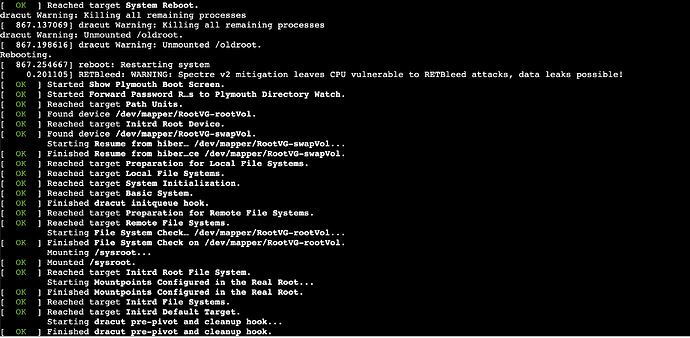After upgrading my OS from AlmaLinux8.9 to 9.3 I noticed the following warning:
RETBleed: WARNING: Spectre v2 mitigation leaves CPU vulnerable to RETBleed attacks, data leaks possible!
Prior to upgrading, I checked my cpuinfo using lscpu command
[root@agw1mlnlwbh04 ~]# lscpu
Architecture: x86_64
CPU op-mode(s): 32-bit, 64-bit
Byte Order: Little Endian
CPU(s): 4
On-line CPU(s) list: 0-3
Thread(s) per core: 2
Core(s) per socket: 2
Socket(s): 1
NUMA node(s): 1
Vendor ID: GenuineIntel
BIOS Vendor ID: Intel(R) Corporation
CPU family: 6
Model: 85
Model name: Intel(R) Xeon(R) Platinum 8259CL CPU @ 2.50GHz
BIOS Model name: Intel(R) Xeon(R) Platinum 8259CL CPU @ 2.50GHz
Stepping: 7
CPU MHz: 2500.004
BogoMIPS: 5000.00
Hypervisor vendor: KVM
Virtualization type: full
L1d cache: 32K
L1i cache: 32K
L2 cache: 1024K
L3 cache: 36608K
NUMA node0 CPU(s): 0-3
Flags: fpu vme de pse tsc msr pae mce cx8 apic sep mtrr pge mca cmov pat pse36 clflush mmx fxsr sse sse2 ss ht syscall nx pdpe1gb rdtscp lm constant_tsc rep_good nopl xtopology nonstop_tsc cpuid aperfmperf tsc_known_freq pni pclmulqdq ssse3 fma cx16 pcid sse4_1 sse4_2 x2apic movbe popcnt tsc_deadline_timer aes xsave avx f16c rdrand hypervisor lahf_lm abm 3dnowprefetch invpcid_single pti fsgsbase tsc_adjust bmi1 avx2 smep bmi2 erms invpcid mpx avx512f avx512dq rdseed adx smap clflushopt clwb avx512cd avx512bw avx512vl xsaveopt xsavec xgetbv1 xsaves ida arat pku ospke
After the OS upgrade to 9.3 and running lscpu command I’m getting this output:
[root@agw1mlnlwbh04 ~]# lscpu
Architecture: x86_64
CPU op-mode(s): 32-bit, 64-bit
Address sizes: 46 bits physical, 48 bits virtual
Byte Order: Little Endian
CPU(s): 2
On-line CPU(s) list: 0
Off-line CPU(s) list: 1
Vendor ID: GenuineIntel
BIOS Vendor ID: Intel(R) Corporation
Model name: Intel(R) Xeon(R) Platinum 8259CL CPU @ 2.50GHz
BIOS Model name: Intel(R) Xeon(R) Platinum 8259CL CPU @ 2.50GHz
CPU family: 6
Model: 85
Thread(s) per core: 1
Core(s) per socket: 1
Socket(s): 1
Stepping: 7
BogoMIPS: 5000.01
Flags: fpu vme de pse tsc msr pae mce cx8 apic sep mtrr pge mca cmov pat pse36 clflush mmx fxsr sse sse2 ss ht syscall nx pdpe1gb rd
tscp lm constant_tsc rep_good nopl xtopology nonstop_tsc cpuid tsc_known_freq pni pclmulqdq ssse3 fma cx16 pcid sse4_1 sse4_2
x2apic movbe popcnt tsc_deadline_timer aes xsave avx f16c rdrand hypervisor lahf_lm abm 3dnowprefetch invpcid_single pti fsg
sbase tsc_adjust bmi1 avx2 smep bmi2 erms invpcid mpx avx512f avx512dq rdseed adx smap clflushopt clwb avx512cd avx512bw avx5
12vl xsaveopt xsavec xgetbv1 xsaves ida arat pku ospke
Virtualization features:
Hypervisor vendor: KVM
Virtualization type: full
Caches (sum of all):
L1d: 32 KiB (1 instance)
L1i: 32 KiB (1 instance)
L2: 1 MiB (1 instance)
L3: 35.8 MiB (1 instance)
NUMA:
NUMA node(s): 1
NUMA node0 CPU(s): 0
Vulnerabilities:
Gather data sampling: Unknown: Dependent on hypervisor status
Itlb multihit: KVM: Mitigation: VMX unsupported
L1tf: Mitigation; PTE Inversion
Mds: Vulnerable: Clear CPU buffers attempted, no microcode; SMT Host state unknown
Meltdown: Mitigation; PTI
Mmio stale data: Vulnerable: Clear CPU buffers attempted, no microcode; SMT Host state unknown
Retbleed: Vulnerable
Spec rstack overflow: Not affected
Spec store bypass: Vulnerable
Spectre v1: Mitigation; usercopy/swapgs barriers and __user pointer sanitization
Spectre v2: Mitigation; Retpolines, STIBP disabled, RSB filling, PBRSB-eIBRS Not affected
Srbds: Not affected
Tsx async abort: Not affected
